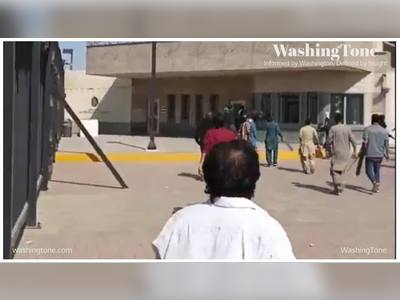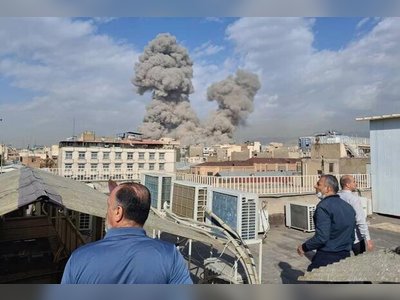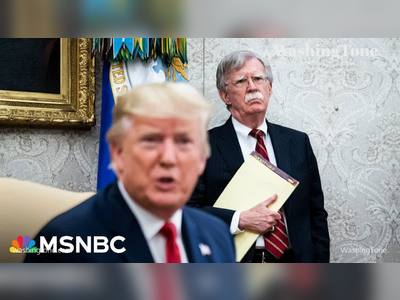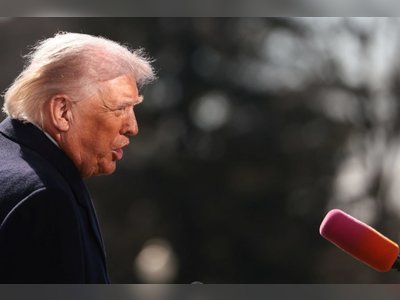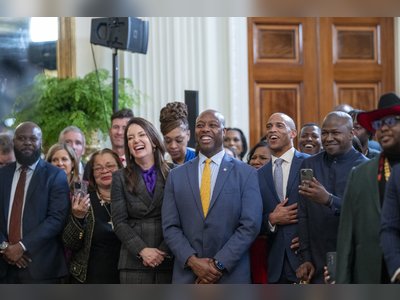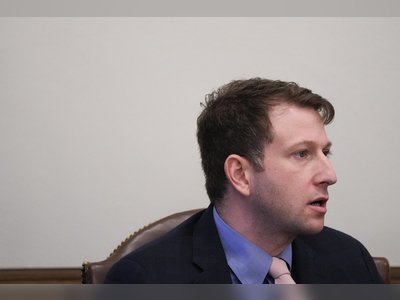White HouseSenateThe HouseSupreme CourtFederal ReserveDOJState DepartmentTreasuryCensusBudget OfficeTrade Representative
WashingTone
Informed by Washington, Defined by Insight
Monday, Mar 02, 2026
WashingTone

U.S.-ROK Nuclear Consultative Group: Enhancing Extended Deterrence Toward North Korea
The NCG, established by the U.S.-ROK Washington Declaration, seeks to enhance collaboration on nuclear deterrence in reaction to North Korea's escalating threat.
The United States and the Republic of Korea (ROK) have enhanced their defense and nuclear deterrence collaboration through the Nuclear Consultative Group (NCG), a bilateral consultative entity created as part of the U.S.-ROK Washington Declaration in April 2023.
This group aims to address the increasing nuclear threats from the Democratic People’s Republic of Korea (DPRK), reinforce the U.S.-ROK alliance, and bolster the security of the Indo-Pacific region.
It also supports broader objectives of regional stability and nonproliferation.
Purpose and Function of the NCG
The NCG was established as a crucial mechanism to promote the goals of extended deterrence, an arrangement in which the U.S. commits to defending the ROK using its full range of military capabilities, including nuclear weapons.
As North Korea's nuclear threat continues to increase, the NCG serves as a platform for the U.S. and ROK to engage in coordinated, high-level discussions on nuclear strategy, including planning for potential contingencies.
These discussions are critical in managing the evolving threat from the DPRK and ensuring that both nations are aligned in their responses.
The NCG's mandate is to enhance both countries' deterrence capabilities, prevent potential nuclear escalation, and provide a forum for strategic consultations during crises.
The NCG is co-chaired by senior officials from both the U.S. Department of Defense and the ROK Ministry of National Defense and includes representatives from various government agencies such as national security, intelligence, military, and diplomatic services.
Key Participants and Structure
The NCG is co-chaired at the assistant secretary level, with participation from senior representatives of both nations' defense and foreign ministries.
The group holds principal-level meetings twice a year, alternating between Seoul and Washington, and is supported by frequent working-level sessions.
U.S. participants include officials from the Department of Defense, U.S. Forces Korea, U.S. Indo-Pacific Command, U.S. Strategic Command, the Department of State, and the National Security Council.
On the ROK side, participants come from the Ministry of National Defense, Ministry of Foreign Affairs, National Security Office, and the intelligence community.
The NCG has been pivotal in improving communication and coordination between the U.S. and ROK governments, enhancing their ability to respond to the DPRK’s provocations.
It ensures that both parties remain aligned on nuclear and conventional deterrence strategies, enabling them to act swiftly and decisively should a crisis arise.
Key Achievements and Contributions
A core function of the NCG is to enable joint military and intelligence assessments to better understand North Korea's nuclear threat.
By enhancing information-sharing between the two allies, the NCG has strengthened the readiness of both nations to respond to any aggressive action from the DPRK.
This information-sharing extends to threat assessments, joint exercises, and strategic simulations, which help prepare U.S. and ROK officials to tackle a range of nuclear and conventional challenges.
Additionally, the NCG has advanced nuclear and strategic planning, particularly by integrating nuclear deterrence with conventional military operations.
This has led to a more comprehensive approach to the defense of the Korean Peninsula, with a stronger emphasis on the potential for combined operations between U.S. and ROK forces during a crisis.
Another significant achievement of the NCG has been the strengthening of communication channels between the U.S. and ROK governments, especially in times of heightened tension.
By increasing the resilience of these communication systems, the NCG ensures that both nations can coordinate effectively in a crisis, reducing the risk of miscommunication or escalation.
Regularized tabletop exercises (TTXs) and simulations conducted under the NCG framework have also improved the operational readiness of both allies in the face of DPRK provocations.
Moreover, the NCG has increased the visibility of U.S. strategic assets in the region.
This includes the deployment of nuclear-powered submarines and the enhanced presence of U.S. strategic bombers, serving as a clear demonstration of the U.S. commitment to the defense of South Korea and regional deterrence.
These actions send a strong message to North Korea, indicating that any further aggression would be met with a firm and overwhelming response.
The Role of Nuclear Deterrence
A crucial aspect of the NCG is its focus on nuclear deterrence, particularly concerning North Korea's growing nuclear capabilities.
The NCG ensures that both the U.S. and the ROK maintain a robust nuclear deterrence posture in the face of North Korea’s expanding nuclear arsenal.
This includes regular consultations on nuclear strategy and operations essential for deterring potential threats from the DPRK.
The U.S.-ROK Guidelines for Nuclear Deterrence and Nuclear Operations on the Korean Peninsula, developed as part of the NCG framework, outline principles and procedures for nuclear deterrence in the region.
These guidelines ensure that both nations are on the same page regarding nuclear deterrence and their strategic objectives are aligned.
They also facilitate the integration of nuclear and conventional forces to maximize deterrence effectiveness.
Furthermore, the NCG has developed educational programs, such as the nuclear deterrence immersion course for ROK officials, to enhance their understanding of U.S. nuclear strategy and operations.
This initiative aims to foster greater alignment between the two nations and increase the operational effectiveness of U.S.-ROK nuclear cooperation.
Looking Ahead: Continued Cooperation and Strategic Challenges
While the NCG has made substantial progress, challenges remain.
North Korea's ongoing development of nuclear weapons and missile technology poses a persistent threat, and both the U.S. and ROK constantly refine their strategies to counter this evolving danger.
The NCG will continue to be the cornerstone of their nuclear deterrence cooperation, facilitating the exchange of ideas and strategies to address emerging threats and ensure that both nations are prepared for any contingency.
The NCG will also play a vital role in shaping future nonproliferation discussions, as both the U.S. and ROK work to prevent further nuclear weapons spread in the region.
As North Korea's provocations persist, the NCG will remain a crucial forum for managing tensions and ensuring that the U.S.-ROK alliance remains strong, unified, and ready to address the nuclear challenges of the 21st century.
This group aims to address the increasing nuclear threats from the Democratic People’s Republic of Korea (DPRK), reinforce the U.S.-ROK alliance, and bolster the security of the Indo-Pacific region.
It also supports broader objectives of regional stability and nonproliferation.
Purpose and Function of the NCG
The NCG was established as a crucial mechanism to promote the goals of extended deterrence, an arrangement in which the U.S. commits to defending the ROK using its full range of military capabilities, including nuclear weapons.
As North Korea's nuclear threat continues to increase, the NCG serves as a platform for the U.S. and ROK to engage in coordinated, high-level discussions on nuclear strategy, including planning for potential contingencies.
These discussions are critical in managing the evolving threat from the DPRK and ensuring that both nations are aligned in their responses.
The NCG's mandate is to enhance both countries' deterrence capabilities, prevent potential nuclear escalation, and provide a forum for strategic consultations during crises.
The NCG is co-chaired by senior officials from both the U.S. Department of Defense and the ROK Ministry of National Defense and includes representatives from various government agencies such as national security, intelligence, military, and diplomatic services.
Key Participants and Structure
The NCG is co-chaired at the assistant secretary level, with participation from senior representatives of both nations' defense and foreign ministries.
The group holds principal-level meetings twice a year, alternating between Seoul and Washington, and is supported by frequent working-level sessions.
U.S. participants include officials from the Department of Defense, U.S. Forces Korea, U.S. Indo-Pacific Command, U.S. Strategic Command, the Department of State, and the National Security Council.
On the ROK side, participants come from the Ministry of National Defense, Ministry of Foreign Affairs, National Security Office, and the intelligence community.
The NCG has been pivotal in improving communication and coordination between the U.S. and ROK governments, enhancing their ability to respond to the DPRK’s provocations.
It ensures that both parties remain aligned on nuclear and conventional deterrence strategies, enabling them to act swiftly and decisively should a crisis arise.
Key Achievements and Contributions
A core function of the NCG is to enable joint military and intelligence assessments to better understand North Korea's nuclear threat.
By enhancing information-sharing between the two allies, the NCG has strengthened the readiness of both nations to respond to any aggressive action from the DPRK.
This information-sharing extends to threat assessments, joint exercises, and strategic simulations, which help prepare U.S. and ROK officials to tackle a range of nuclear and conventional challenges.
Additionally, the NCG has advanced nuclear and strategic planning, particularly by integrating nuclear deterrence with conventional military operations.
This has led to a more comprehensive approach to the defense of the Korean Peninsula, with a stronger emphasis on the potential for combined operations between U.S. and ROK forces during a crisis.
Another significant achievement of the NCG has been the strengthening of communication channels between the U.S. and ROK governments, especially in times of heightened tension.
By increasing the resilience of these communication systems, the NCG ensures that both nations can coordinate effectively in a crisis, reducing the risk of miscommunication or escalation.
Regularized tabletop exercises (TTXs) and simulations conducted under the NCG framework have also improved the operational readiness of both allies in the face of DPRK provocations.
Moreover, the NCG has increased the visibility of U.S. strategic assets in the region.
This includes the deployment of nuclear-powered submarines and the enhanced presence of U.S. strategic bombers, serving as a clear demonstration of the U.S. commitment to the defense of South Korea and regional deterrence.
These actions send a strong message to North Korea, indicating that any further aggression would be met with a firm and overwhelming response.
The Role of Nuclear Deterrence
A crucial aspect of the NCG is its focus on nuclear deterrence, particularly concerning North Korea's growing nuclear capabilities.
The NCG ensures that both the U.S. and the ROK maintain a robust nuclear deterrence posture in the face of North Korea’s expanding nuclear arsenal.
This includes regular consultations on nuclear strategy and operations essential for deterring potential threats from the DPRK.
The U.S.-ROK Guidelines for Nuclear Deterrence and Nuclear Operations on the Korean Peninsula, developed as part of the NCG framework, outline principles and procedures for nuclear deterrence in the region.
These guidelines ensure that both nations are on the same page regarding nuclear deterrence and their strategic objectives are aligned.
They also facilitate the integration of nuclear and conventional forces to maximize deterrence effectiveness.
Furthermore, the NCG has developed educational programs, such as the nuclear deterrence immersion course for ROK officials, to enhance their understanding of U.S. nuclear strategy and operations.
This initiative aims to foster greater alignment between the two nations and increase the operational effectiveness of U.S.-ROK nuclear cooperation.
Looking Ahead: Continued Cooperation and Strategic Challenges
While the NCG has made substantial progress, challenges remain.
North Korea's ongoing development of nuclear weapons and missile technology poses a persistent threat, and both the U.S. and ROK constantly refine their strategies to counter this evolving danger.
The NCG will continue to be the cornerstone of their nuclear deterrence cooperation, facilitating the exchange of ideas and strategies to address emerging threats and ensure that both nations are prepared for any contingency.
The NCG will also play a vital role in shaping future nonproliferation discussions, as both the U.S. and ROK work to prevent further nuclear weapons spread in the region.
As North Korea's provocations persist, the NCG will remain a crucial forum for managing tensions and ensuring that the U.S.-ROK alliance remains strong, unified, and ready to address the nuclear challenges of the 21st century.
